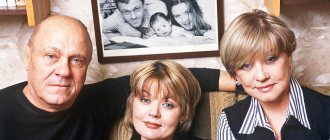Yulia Tymoshenko: “gas princess” with an eye on the throne
Yulia Tymoshenko could have become a gymnast, but she became a politician. She devoted her whole life to the struggle for power. Tymoshenko was prime minister twice, a presidential candidate three times, and was imprisoned twice. Politeka reports this.
- Biography
- Family
- Education
- Career
- Political activity
- Compromising evidence and scandals
- Mafia connection
- Lobbying Putin's interests
- In the "Peacemaker" database
- Declaration
- Latest news from political career
Family
Her father, Vladimir Abramovich Grigyan, left the family when his daughter was three years old, so the future Prime Minister of Ukraine and three times presidential candidate was raised only by her mother Lyudmila Nikolaevna Telegina, who worked as a dispatcher in a taxi company.
The childhood of the future Ukrainian politician was spent in difficult living conditions; there was a catastrophic lack of money. In her youth, Yulia was actively involved in rhythmic gymnastics, and therefore she was predicted to have a great career in sports.
In high school, the girl decided to change her father’s last name and take her mother’s last name, so in all graduation documents the schoolgirl is referred to as Yulia Telegina.
At the age of 19, Yulia married Alexander Timoshenko. The guy was a year younger than her. Alexander's father served as secretary of the Kirov regional executive committee of Dnepropetrovsk. The couple had a daughter, Evgenia.
Businesswoman
The career of the future Prime Minister of Ukraine began in 1984, at that time the woman worked at a machine-building enterprise in Dnepropetrovsk, holding the position of engineer-economist.
With the beginning of perestroika, when the country was actively entering into market relations, the couple decided to start their own business . Having collected start-up capital (5 thousand rubles), in which Gennady Timoshenko, Alexander’s father, significantly helped them, the young people opened a video rental shop.
Having received their first profit, Alexander and Yulia created the youth association “Terminal”, whose activities were related to the processing of petroleum products. Gennady’s investments, as well as the determination of young people, their desire to work and earn money, helped the family overcome the economic crisis of the 90s and escape from devastation.
Five years later, a small oil refinery transformed into a reputable financial and industrial company that specialized in barter transactions. She brought in incredible income (about $10 million) and was very popular.
At that time, the Ukrainian-British corporation UESU, headed by Tymoshenko, was a monopolist in the supply of gas from Russia to Ukraine. According to some reports, Lady Yu controlled about 30% of the country's economy. But in 1996, the company began to have financial problems, which forced its leader to radically change her field of activity and become a politician.
Education
Yulia Timoshenko studied at school No. 75 in Dnepropetrovsk. She did not show any particular zeal for science, but she studied without C grades. After graduating from school, the girl entered the Dnepropetrovsk Mining Institute at the mining faculty, but was expelled from the first year for poor performance in higher mathematics .
A year later she entered the Dnepropetrovsk State University at the Faculty of Economics. There Yulia studied with a degree in Economic Cybernetics. After the birth of her daughter, in 1980, she continued her studies with a degree in labor economics. She received a honors diploma as an engineer-economist in 1984.
In 1999, Yulia Tymoshenko defended her thesis on the topic “State regulation of the tax system” and became a candidate of economic sciences at the Kiev National Economic University.
Mastering the profession
Despite all the worries about her husband and young daughter, Yulia Vladimirovna was still able to graduate from the university with honors in 1984. She deservedly received a red diploma. Then she was sent to work at the Dnepropetrovsk Machine-Building Plant named after Lenin as an economist, where she worked until 1990. This ends the Soviet period in the life of the iron lady. Yulia Tymoshenko, whose biography is full of difficult moments, is embarking on the path of mastering big business and the political arena.
Career
In her youth, Yulia Tymoshenko begins to take an active interest in business . The young economist begins his career at the Dnepropetrovsk Machine-Building Plant as an engineer-economist. At that time, already married, Yulia Vladimirovna decided to open a “video rental point,” for which she had to borrow money from friends.
Having earned her first money, Tymoshenko organized the “Terminal” youth center , which, according to her idea, was supposed to sell petroleum products. For this, primary capital was needed, which Yulia’s father-in-law invested in the business.
In 1991, the Tymoshenko spouses created the Ukrainian Gasoline (KUB) corporation, which trades fuel and lubricants.
In 1995, KUB, with the support of the then-current governor of the Dnepropetrovsk region, Pavel Lazarenko, grew into the Ukrainian-British industrial and financial corporation “Unified Energy Systems of Ukraine” (UESU). This structure was headed by Yulia Tymoshenko.
At that time, the corporation had a monopoly on the sale of Russian gas in Ukraine. The company is credited with a turnover of more than $10 billion. In fact, this is not true, since the price of oil was low at that time, and sales volumes were no more than 60 cubic meters. in year. However, the turnover was still significant.
In 1996, the UESU, according to Tymoshenko herself, suffered great “political” and financial difficulties and Yulia Vladimirovna went into politics.
Business activities
Yulia Tymoshenko has proven herself to be a talented businesswoman. It all started in her youth, when Julia and her husband organized film rentals. In the near future, in 1989, it was also created together with my husband.
After 2 years, in the early 90s, Yulia and Alexander founded. This project grew into a large corporation “Unified Energy Systems of Ukraine”. Through it, natural gas was purchased from the Russian Federation. Despite the difficult period for the CIS, the business brought considerable income. 5 years after its founding, the corporation was liquidated, and Lady Yu decided to go into politics.
Political activity
In 1997, Yulia Tymoshenko became a people's deputy. She wins the by-election in the majoritarian constituency in the Kirovograd region. 92% of voters voted for Tymoshenko.
In 1998, Yulia Vladimirovna entered parliament for the second time in the same constituency. And in 1999 he created the All-Ukrainian Association “Batkivshchyna” , at the head of which he entered the Cabinet of Ministers.
She was appointed Deputy Prime Minister for fuel and energy issues in the government of Viktor Yushchenko, where she immediately proved herself, falling into disgrace with many politicians and major businessmen of the country. As a result, in 2000, Alexander Timoshenko, her husband, was arrested, and a year later Yulia Vladimirovna herself already ended up in a pre-trial detention center .
They were accused of smuggling Russian gas to Ukraine and tax evasion.
Later, the Kiev court recognized the charges against Tymoshenko as unfounded , as a result of which the defendants in the case were released from custody, closing all criminal cases under the UESU.
Having been released from prison, Yulia Tymoshenko begins an active struggle against the current President Leonid Kuchma. Having organized the National Salvation Forum, Tymoshenko becomes the head of the opposition action “Ukraine without Kuchma” .
During the 2004 presidential elections, Yulia Tymoshenko supported Viktor Yushchenko and became one of the leaders of the Orange Revolution.
Viktor Andreevich, having led the country, appoints his ally in the “orange Maidan” as Prime Minister of Ukraine .
In September 2005, Yushchenko dismissed Tymoshenko's government due to internal conflict between the branches of government, which caused a mixed reaction among Ukrainian politicians.
The American financial and economic magazine Forbes calls Yulia Tymoshenko the third most influential woman on the planet.
In the parliamentary elections in 2006, the Yulia Tymoshenko Bloc (BYuT), created by the former prime minister, beat the Party of Regions, gaining more than 22% of the votes. This allowed the “orange coalition” to take more than half of the seats in the Verkhovna Rada. The new political formation also received the bulk of government portfolios .
In 2007, due to the political crisis, Yushchenko dissolved parliament. President Tymoshenko supports this decision. In the early elections to the Verkhovna Rada, the BYuT party improves its position, which gives Tymoshenko the opportunity to again take the main position in the government and become the country's prime minister for the second time.
During the same period, Yulia Tymoshenko became the main figure in the gas conflict between Russia and Ukraine . She sought a transition to direct supplies of Russian gas, bypassing the intermediary person. President Yushchenko was against this and the signing of the agreement was disrupted.
As a result, Russia stopped supplying “blue fuel” to Ukraine.
Ukrainian-Russian relations have reached a dead end , and Yulia Tymoshenko will soon end up in prison again . She was accused of providing a disservice to Moscow, since the gas supply agreement was allegedly signed with enslaving conditions and an unprecedentedly inflated price .
In 2010, Yulia Tymoshenko took part in the presidential elections for the first time. She loses to Yanukovych by 3.48%. After this, Tymoshenko’s government was declared no-confidence, she was dismissed, and the post of prime minister was taken by Profesor’s comrade-in-arms, Mykola Azarov.
During the presidency of Viktor Yanukovych, several criminal cases were opened against Tymoshenko. She was accused of signing an enslaving gas agreement with Russia, misusing “Kyoto money,” and financial fraud in the purchase of “cars for rural medicine.”
Based on the totality of all cases, the court sentenced Tymoshenko to 7 years in prison. The verdict caused outrage in Ukrainian society. In the EU countries and the USA, the verdict was called politically motivated .
From December 2011 to February 2014, Yulia Tymoshenko stayed in the Kachanovskaya correctional colony and in the Central Clinical Hospital No. 5 in Kharkov.
As a result of the victory of the Revolution of Dignity, Yanukovych fled to Russia, and Yulia Tymoshenko was released.
Throughout her career, Yulia Tymoshenko has never hidden her presidential ambitions. On January 23, 2020, she submitted documents to the Central Election Commission to take part as a candidate for President of Ukraine for the third time.
However, the “gas princess” failed, not even making it to the second round.
Yulia Timoshenko
Yulia Vladimirovna Tymoshenko is the first woman prime minister in the history of Ukraine, as well as the first woman to hold this post in the CIS countries. Remains one of the most influential politicians in Ukraine. She became a presidential candidate in the 2020 elections, but unexpectedly lost her rating in recent months and failed to make it to the second round, losing out to showman Vladimir Zelensky and President Poroshenko.
Family of Yulia Tymoshenko
Yulia Tymoshenko was born on November 27, 1960 in Dnepropetrovsk, where her parents were native residents. Timoshenko's mother is Lyudmila Nikolaevna Telegina (b. 1937, Dnepropetrovsk). Tymoshenko’s father is Vladimir Abramovich Grigyan (b. 1937, Dnepropetrovsk). He left his family when Yulia was two years old.
Grandmother - Grigyan Maria Iosifovna (b. 1909). Grandfather - Abram Kelmanovich Kapitelman (b. 1914), died at the front on November 8, 1944 with the rank of senior lieutenant of the signal forces.
According to Tymoshenko herself, in her family, on her father’s side, all are Latvians up to the tenth generation, and on her mother’s side, all are Ukrainians. Great-grandfather Joseph Iosifovich Grigyan, according to Yulia, was actually Grigyanis.
Yulia Tymoshenko in childhood
It should be noted that the Wikipedia article is silent about Tymoshenko’s mother and her Ukrainian ancestors, and there is almost no information about this in open sources; there is conflicting information on the Internet about the ethnic origin of her father. There is debate about Yulia Tymoshenko's nationality.
Youth, education of Yulia Tymoshenko
In 1977, Yulia Timoshenko graduated from secondary school No. 75 in Dnepropetrovsk. Yulia Tymoshenko's mother worked as a dispatcher in a taxi company. As Yulia Vladimirovna recalls, they lived modestly, in conditions of strict economy.
Julia was friends mainly with boys. Yulia Grigyan was bored with the girls. She didn't play with dolls. I studied at school without grades. Julia was fond of rhythmic gymnastics.
After school, Yulia Vladimirovna entered the Dnepropetrovsk State University, the Faculty of Economics, choosing the specialty “economic cybernetics”, and in 1984 she graduated with honors, specializing in engineer-economist.
In 1999, Tymoshenko, already a businesswoman and politician, defended her PhD thesis on the topic “State regulation of the tax system” at the Kiev National Economic University. Received an academic degree of Candidate of Economic Sciences.
Big business and Yulia Tymoshenko
After graduating from university, Yulia Tymoshenko worked as an engineer-economist at the Dnepropetrovsk Machine-Building Plant (1984−1988).
Yulia Tymoshenko got married while still studying at the university. Her version of meeting her future husband Alexander Timoshenko is very romantic. One day Alexander called her by accident - he just got the wrong number. He liked the voice of the girl who answered, and they began dating. And in 1979, the young couple celebrated their wedding. In 1980, Julia and Alexander had a daughter, Evgenia.
In 1989, Yulia Timoshenko became commercial director of the Dnepropetrovsk youth
With perestroika, Yulia Vladimirovna’s successful march along the difficult roads of business began. In 1988, Yulia and Alexander Timoshenko opened their own business - a “video rental point” - with the help of her husband’s father, Gennady Timoshenko, who headed the “film distribution department” in the Dnepropetrovsk regional council. In 1989, Yulia and Alexander, with the support of the Dnepropetrovsk Regional Committee of the Komsomol, created a youth organization. Yulia Timoshenko became its commercial director (1989−1991).
In 1991, Yu.V. Tymoshenko and her husband founded the Ukrainian Gasoline corporation. Since this year, Yulia Vladimirovna has been commercial, then general director of the joint venture “Ukrainian Gasoline Corporation” (KUB). 1995−1996 headed the corporation “Unified Energy Systems of Ukraine” (UESU), created on the basis of KUB.
The company earned enormous money from barter transactions - it sold products of Ukrainian enterprises (mainly to Russia) in exchange for energy resources.
Political career of Yulia Tymoshenko
At the beginning of 1997, Yulia Tymoshenko, as president of the UESU, according to various estimates, controlled up to 25% of the Ukrainian economy.
In the same year, Tymoshenko decided to go into politics and nominated herself for the by-election in the Bobrinetsky majoritarian constituency No. 229 of the Kirovograd region. Yulia Vladimirovna showed one of the best results - 92.3% of the votes. In January 1997, Yulia Tymoshenko received a deputy mandate.
In the parliament of S.V. Tymoshenko joined the pro-presidential party Constitutional Center. Having become a people's deputy, Tymoshenko is actively involved in party work - in mid-1997 she signed up for membership in "Gromada" - a party that was created four years ago by Pavel Lazarenko (at that time the prime minister, later convicted in the USA for corruption - he was illegally transferred to this country, according to Ukrainian information, more than 320 million dollars).
In 1998, Yulia Tymoshenko headed the Verkhovna Rada Committee on Budget Issues. Under the leadership of Yulia Vladimirovna, the Budget Committee of the Verkhovna Rada developed the “100 weeks of decent life” program. Why only 100 weeks were allocated is a mystery.
2001 President of Ukraine Leonid Kuchma considers the recommendation of the country's Prosecutor General Mikhail Potebenko to remove Yulia Tymoshenko (pictured) from the post of Deputy Prime Minister for fuel and energy issues (Photo: Yuriy Ilyenko/TASS)
In 2002, Yulia Tymoshenko created a bloc named after herself - the Yulia Tymoshenko Bloc (BYuT).
On July 2, 2004, Tymoshenko, on behalf of BYuT, signed an agreement with Viktor Yushchenko on the creation of the “Power of the People” coalition in support of Yushchenko in the presidential elections, and the opportunity was provided for Tymoshenko to head the future government.
When Viktor Yushchenko did not win in the first round, Yulia Tymoshenko called on opposition supporters to gather on the Independence Square in Kyiv on November 21-22 to defend the results of their expression of will. Tymoshenko became one of the leaders of mass protests against the “falsification” of the presidential elections, which were called the “Orange Revolution”.
Premiership of Yulia Tymoshenko
After the victory of Viktor Yushchenko as a result of the first Maidan and the illegal third round of elections, the Verkhovna Rada of Ukraine on February 4, 2005 approved Yulia Vladimirovna as Prime Minister of the country - 375 votes in favor (out of 450).
2005. President of Ukraine Viktor Yushchenko and Prime Minister of Ukraine Yulia Tymoshenko during an extended meeting of the Cabinet of Ministers (Photo: Alexander Prokopenko/TASS)
The main points that characterized the internal economic activities of the Cabinet of Ministers of Yulia Tymoshenko were the increase in salaries, pensions, scholarships (one and a half to two times), a 12-fold increase in the lump sum benefit for the birth of a child, the “Smuggling - Stop” campaign, the reprivatization of 3,000 enterprises, including control over the largest iron and steel plant, Krivorozhstal, was returned to the state (which was resold in October 2005 for $4.8 billion, 2.4 times more than the starting price). In April-May 2005, the so-called “gasoline crisis” and “sugar crisis” occurred, when prices for sugar and gasoline rose by 30-50% in 2-3 weeks. For this, Prime Minister Tymoshenko was criticized, including by President Yushchenko.
2005 Former Prime Minister Yulia Tymoshenko during the celebration of the anniversary of the Orange Revolution on Maidan Nezalezhnosti (Photo: Alexander Prokopenko/TASS)
On August 24, on Ukraine's Independence Day, speaking on the Maidan, President Yushchenko called Tymoshenko's Cabinet the best. But soon, on September 8, 2005, he dismissed the government of Yulia Tymoshenko due to conflicts and scandals within the government. At the same time, Yushchenko fired NSDC Secretary Petro Poroshenko, who found himself at the epicenter of a corruption scandal.
Criminal cases against Yulia Tymoshenko
Yulia Vladimirovna's political life is filled with ups and downs. In 2005-2007, Tymoshenko was in opposition.
The Prosecutor's Office in Ukraine and the Military Prosecutor's Office of Russia opened several criminal cases that related primarily to the activities of the UESU (in 1996-1997), as well as criminal cases regarding “Kyoto money” and “rural medicine vehicles” (in 2007-2010 years).
2007 Leader of the Ukrainian Party of Regions Viktor Yanukovych and BYuT leader Yulia Tymoshenko during a meeting (Photo: Vladimir Sindeev/TASS)
But the “gas case” caused the greatest resonance. Yulia Tymoshenko was accused of drawing up a gas agreement with Russia that was enslaving for Ukraine in 2009.
When Yulia Tymoshenko lost the 2010 presidential campaign to Viktor Yanukovych, the new president remembered the high price of gas under the agreement that Yulia Vladimirovna had concluded, and in October 2011, after long trials, the Pechersky District Court sentenced Tymoshenko: 7 years in prison and compensation of 1.5 billion UAH. financial losses.
2010 Propaganda poster depicting Ukrainian presidential candidate Yuri Tymoshenko on one of the city streets (Photo: Vladimir Sindeev/TASS)
Yulia Tymoshenko was placed in Kachanovskaya colony No. 54 in Kharkov to serve her sentence. Tymoshenko’s imprisonment caused a significant international outcry, and European politicians continually demanded that Yanukovych release Yulia Vladimirovna.
Rally of opposition deputies in support of former Prime Minister of Ukraine Yulia Tymoshenko near the building of the Verkhovna Rada (Photo: Maxim Nikitin/TASS)
After the coup d'etat in February 2014, the Verkhovna Rada of Ukraine adopted a resolution “On the fulfillment of Ukraine’s international obligations on the release of Yu.V. Tymoshenko.” And already on February 22, 2014, the free Yulia Tymoshenko appeared in a wheelchair on the stage of Independence Square and again joined the political struggle.
2014 Former Prime Minister of Ukraine Yulia Tymoshenko, released by decision of the Verkhovna Rada of Ukraine, during a speech on Independence Square (Photo: Mikhail Pochuev/TASS)
However, as a result of the 2014 presidential elections, she took 2nd place with a result of 13.13%, losing to Petro Poroshenko. According to many, Yulia Tymoshenko deliberately stepped into the shadows in order to play in the opposition field in extremely difficult times.
Ukrainian presidential elections 2019
Yulia Tymoshenko has been gathering strength for revenge and, according to experts, is one of the favorites in the Ukrainian presidential elections in 2020.
According to one of the polls at the end of 2020, Petro Poroshenko ranks third in the ranking of candidates with 8.6%. In first place is the leader of “Batkivshchyna” Yulia Tymoshenko with 14.2%, in second place is comedian-showman Vladimir Zelensky - 9% of respondents are ready to vote for him.
Poroshenko has no chance in the presidential elections in Ukraine, believes the leader of the Batkivshchyna party, Yulia Tymoshenko, based on the results of regional elections in this country.
“Local elections showed the entire distribution of votes. Deputies of the Batkivshchyna party received 34 percent, Petro Poroshenko’s bloc received 23 percent, and then for a long, long time there was no one. The choice of people suggests that in the second round of elections our team and Poroshenko’s team will meet with approximately the same result, 34 percent to 23 percent. That is why I can firmly say that my opponent does not have a single chance in the second round,” Ukraine news quoted Tymoshenko as saying.
Tymoshenko noted that she was ready to sit down at the negotiating table with Russian President Vladimir Putin. During the meeting, she wants to resolve the conflict in southeastern Ukraine. In the fall, Yulia Tymoshenko said that if she is elected president of the Independent, she will demand from the Russian Federation “compensation for losses” due to the loss of Donbass and Crimea. According to Tymoshenko, the amount of compensation will be 100 billion euros. In Russia, politicians called this idea stupid.
Tymoshenko also promised Ukrainians a “gas paradise” and said that she would submit a bill to parliament to change the procedure for providing the population with gas.
"SP" wrote that Ukrainian businessman Igor Kolomoisky considers Tymoshenko the leader of the presidential race in Ukraine. “In my opinion, 99% of the time she will make it to the second round, she is already in the second round,” the businessman said.
Elections in Ukraine 2020, results
Already on the afternoon of March 31, data from the first exit polls of the presidential elections in Ukraine appeared in the news. Journalist Mustafa Nayem cited the results of five surveys at once. Since, according to Ukrainian law, it is prohibited to publish exit poll results before the end of voting, the authors post them under the guise of “marketing research on the alcohol preferences of Ukrainians,” and the candidates in them are encrypted under the guise of brands of alcoholic beverages.
Vladimir Zelensky corresponds to “ZeBrovka”, Petro Poroshenko - chocolate liqueur, Yulia Tymoshenko - “Veuve Clicquot”, and Yuriy Boyko - “Moscow vodka “Boykaya””.
According to the results of these polls, Zelensky won the first round, for whom from 26.8% to 28.8% of the votes were cast. Four out of five polls showed that Zelensky's opponent in the second round will be incumbent President Poroshenko with a result of 17.43% to 20.5%.
Later, the results of the national exit poll for the presidential elections in Ukraine became known. According to the Ilk Kucheriv Democratic Initiatives Foundation, the Kyiv International Institute of Sociology and the Ukrainian Center for Economic and Political Research named after Alexander Razumkov, Vladimir Zelensky and Petro Poroshenko will advance to the second round.
Vladimir Zelensky received 30.4% of the vote, Petro Poroshenko - 17.8%, Yulia Tymoshenko - 14.2%, Yuriy Boyko - 9.8%.
Ukrainian presidential candidate Yulia Tymoshenko said that according to opinion polls from her camp, she is making it into the second round of elections. As reported in Ukrainian media news, according to these polls, 27% voted for Vladimir Zelensky, 20.9% for Tymoshenko, and 17.5% for Petro Poroshenko.
On April 2, the Central Election Commission of Ukraine confirmed the entry of showman and head of the Servant of the People party Vladimir Zelensky, as well as the current president of the country Petro Poroshenko, into the second round of elections. After processing 99% of the protocols, Zelensky received 30.22% of the votes, Poroshenko - 15.93%. Yulia Tymoshenko came third with 13.4%.
Yuri Boyko took fourth place in the presidential elections - he received 11.68% of the votes. Next were Anatoly Gritsenko, Oleg Smeshko, Oleg Lyashko and Alexander Vilkul. It is worth noting that technology candidate Yuri Timoshenko took 10th place - he took as much as 0.62% from Yulia.
Tymoshenko, after losing the first round of the Ukrainian presidential election, complained that Ukrainians had missed the chance to change the country “for real.”
In her opinion, this chance was not fully realized.
“Unfortunately, the old, rotten, corrupt, clan-based, oligarchic system, for now, I emphasize - for now, remains,” RIA Novosti quoted her as saying.
At the parliamentary elections in the summer of 2020, Tymoshenko again failed to truly return to big politics. True, her party “Batkivshchyna” with 8.18% was ahead of former Ukrainian President Poroshenko’s “European Solidarity”, which received only 8.10% of the votes. The party of the country's President Vladimir Zelensky won - “Servant of the People” received 43.16% of the votes. “Opposition platform - for life” received 13.05% of the votes.
Family of Yulia Tymoshenko
Yulia Vladimirovna’s husband, Alexander Timoshenko, is a businessman.
Yulia Timoshchenko with her daughter Evgenia and husband Alexander
The daughter of Yevgeny Tymoshenko, a graduate of the London School of Economics (with a degree in politics and philosophy), is engaged in the “revival of Ukrainian folk crafts.” Former son-in-law is Englishman Sean Carr, owner of several shops and rock musician. Evgenia's marriage to Carr was dissolved at the beginning of 2012, and on December 19, 2011, Evgenia returned her surname Tymoshenko. New husband - Arthur Chechetkin. On June 27, 2016, their daughter was born.
There are many rumors about the personal life of Yulia Tymoshenko and her romances with various politicians in Ukraine, but given the woman’s profession, some of them are definitely black PR.
Yulia Vladimirovna’s opponents are not asleep; for example, at the “New Course of Ukraine” forum in Kyiv, the leader of the “Batkivshchyna” party was made to blush. During her performance, a young guy climbed onto the stage, handed Tymoshenko a bouquet of flowers and confessed his love to her.
Tymoshenko hugged him and promised that everything would be the way he wanted. Satisfied with the answer, the young man immediately began to undress in joy. On his back there was the inscription “New Deal for Ukraine” and an arrow pointing to the area below the waist, the news was written.
Blushing and laughing nervously, Tymoshenko explained to those gathered that everything that happened had not been planned in advance. After a short pause she laughed again.
Mafia connection
It is known that Yulia Tymoshenko and Pavel Lazarenko were involved in energy trading. It was created by them. The future presidential candidate has earned billions of dollars from this business.
The Russian partner of UESU, from which oil products were supplied to Ukraine, was associated with immigrants from Ukraine Igor Fisherman and Semyon Mogilevich. Having become Prime Minister of Ukraine, Lazarenko even appointed Fisherman as his assistant.
So Fisherman brought Yulia Tymoshenko together with the then head of Gazprom, Rem Vyakhirev. Since then, friendly relations have been established between the head of the Russian gas corporation and the future leader of Batkivshchyna .
As the media wrote, Yulia Vladimirovna often met with Vyakhirev face to face without witnesses. Neither the head of Naftogaz nor the Minister of Energy of Ukraine was even allowed to attend the meeting.
As for Fisherman and the twice-convicted Mogilevich, these two comrades were wanted by the US FBI as “representatives of the Russian mafia.” They were accused of money laundering and fraud .
The “Gas Princess” naturally denied any connection with the mafia. However, in 2008, co-owner oligarch Dmitry Firtash admitted to the US Ambassador about his relationship with Mogilevich. It was Mogilevich, according to Firtash, who introduced him to this business.
The oligarch also told the diplomat that Yulia Tymoshenko also collaborated with Mogilevich.
The notorious website WikiLeaks wrote about this conversation between Firtash and the American.
Youth
As you can learn from sources telling about the biography of Yulia Tymoshenko from birth to the present day, in 1977 the girl graduated from high school No. 75 in her hometown. At this time, my mother worked in a taxi fleet as a dispatcher. Then the woman will tell you that life was not easy in those days; you had to save on literally everything.
Remembering her childhood, Yulia says that she preferred to hang out with boys - it seemed boring with girls. While still a little girl, the future promising politician already showed her strong-willed and strong character. She was not attracted to dolls, and was not interested in role-playing games a la mother-daughter games. For the first time, seeing performances in rhythmic gymnastics, the girl became interested in this sport and was interested in it for a long time. As you can find out from her biography, Yulia Tymoshenko (maiden name - Grigyan) was a good student and an excellent student at different times, she never had C grades.
Lobbying Putin's interests
When Yulia Tymoshenko was in prison for the second time, her daughter Evgenia was actively involved in freeing her mother. In 2012, in her interview with the Austrian publication Der Standard, Evgenia said that she would be honored to meet with Russian President Putin, since she had something to say.
Interestingly, the owner of the Kremlin heard Tymoshenko’s daughter and replied that he was ready to “receive Yulia Vladimirovna with pleasure.” The prisoner’s husband, Alexander, also asked Putin for help.
Moreover, Evgenia Tymoshenko went to Moscow with the goal of finding a person in Putin’s entourage who could easily lead her to the Russian “leader.”
As Russian sources note, Tymoshenko’s first meeting with Putin took place in September 2005 at the dacha of Russian Security Council Secretary Igor Ivanov on his birthday.
According to political scientist Belkovsky, at that meeting an agreement was reached that Russian businessman Pavel Lebedev would be included in the BYuT list for the elections to the Verkhovna Rada in 2006.
And so it happened. Lebedev became a people's deputy from BYuT, then defected to the Party of Regions, and then became the Minister of Defense of Ukraine. During Euromaidan, he left the army, fled to Crimea, and then home to Russia.
The Russian online publication Lenta.ru wrote about the friendly relations between Yulia Tymoshenko and Putin back in September 2012. The authors of the article called Tymoshenko a “special purpose friend” and explained why the Russian ruler protects Yulia Vladimirovna.
The question that worries everyone
In every family of the post-Soviet period, it is quite difficult to find the truth about the origin of ancestors. People moved across the territory of a huge country, blood mixed, and as a result, few people can definitely answer the question about their nationality. Now citizenship has become more important. It is this that determines a person’s attitude towards a particular country, society, or ethnic group.
The family of Yulia Vladimirovna is no exception. A lot was said about her. Some of the statements were almost immediately refuted by Yulia Tymoshenko herself.
Who is a politician by nationality became a question for the majority after she dramatically changed her image in the early 2000s. It was then that Lady Yu first braided her famous braid. Her entire appearance unambiguously began to resemble the image of the poetess Lesya Ukrainka. What did Yulia Tymoshenko want to achieve with such changes? The “before and after” photos are so vivid and eloquent that they involuntarily lead the public to the national question. She was repeatedly accused of pretense and falsehood. People wanted to know the truth about the politician’s true attitude towards their country and were convinced that truthful information about its origins would help “reveal all the cards.”
What truth are her ancestors, and Yulia Tymoshenko herself, hiding? Biography, nationality, some facts from life and a number of publications will most likely help to understand this confusing story.
So, let's go!
In the "Peacemaker" database
The candidate for President of Ukraine appears in the “Purgatory” section of the “Peacemaker” website . Tymoshenko is included here for illegally crossing the State Border of Ukraine and attacking Ukrainian border guards as part of a group of people, as well as for manipulating socially significant information.
The reason for posting on this resource was the complicity and participation of Yulia Tymoshenko in the illegal entry into Ukraine of Mikheil Saakashvili.
In gratitude for this, the former President of Georgia spoke in support of Yulia Vladimirovna on January 22 at the Batkivshchyna congress, apparently forgetting how he was ridiculed by her 10 years ago.
Then the Prime Minister of Ukraine received the Prime Minister of Russia Putin in Crimea. At a joint press conference, the Kremlin owner, as usual, stupidly joked about the seizure of Georgian territory and about Saakashvili. In response to Putin’s stupid jokes and insults to the Georgian president, Tymoshenko laughed infectiously.
Continuing work
As described in the biography of Yulia Tymoshenko (we are talking about her family and political career today), in 1998 a woman became the head of the Rada and was responsible for budget policy. She personally manages the “One Hundred Weeks of Dignified Life” project. True, the media were never able to get an answer from government officials: why exactly one hundred weeks was chosen and why they decided to stop there. Two years later, Kuchma, at that moment being the president of the country, considers Potebenko’s petition, in which the petitioner proposes to remove the woman from her position. A year later, the promising politician forms a bloc named in her honor.
Since 2004, Yulia, on behalf of her own bloc, has entered into an official documented agreement with Yushchenko. This is how “Power of the People” appears, designed to support Yushchenko in the upcoming election campaign. At the same time, the possibility of a new career growth for Yulia was discussed - she had a chance to become the head of government. However, the first election round did not give Yushchenko the desired victory. Yulia coordinated her supporters and called on them to gather on Kyiv’s Independence Square in order to defend their will. It was Yulia who was the inspirer, center and leader of the protests that swept across the country - they gradually grew into a real revolt against falsification. This period will be recorded in the history of the country as the Orange Revolution.
Declaration
The head of the political party “Batkivshchyna”, people’s deputy Yulia Tymoshenko rents her sister’s house in Kozin near Kiev and uses 4 adjacent plots . She entered such data into her tax return for 2020, published in the Unified State Register of Declarations.
Two plots of land belong to Timoshenko’s cousin Tatyana Valerievna Sharapova and, according to the declaration, are located under a rented house. Two more plots that “border the leased property” are owned by the people’s deputy’s aunt Antonina Nikolaevna Ulyakhina.
At the same time, Tymoshenko does not have her own real estate.
According to the declaration, her income for the last year amounted to 560 thousand hryvnia, of which 225.5 thousand were parliamentary salaries . The total income of the spouses Alexander and Yulia Tymoshenko in 2020 amounted to over UAH 4 million. Her husband declared business income of almost 3.4 million.
"Lady Yu" and politics
At the end of 1996, a star lit up on the Ukrainian political horizon, whose name was Yulia Tymoshenko. The biography of the young politician smoothly went to the top. She nominates herself as a candidate for deputy of the Kirovograd region. Julia was able to score 92%. Already at the beginning of 1997, she became a deputy of the Verkhovna Rada and immediately joined the Constitutional Center faction.
Soon she becomes one of the leaders of the Hromada party. Yulia Tymoshenko, in the shortest possible time, was able to raise the rating of this party so high that none of the previous leaders even dared to dream about it. The Ukrainian Orthodox Church sided with Yulia and awarded her the Order of St. Barbara the Great Martyr. A year later, Lady Yu is already the chairman of the Verkhovna Rada Committee on Financial Issues (Budget). The project “One Hundred Weeks to a Decent Life” dates back to this period of her activity. In 1998, Tymoshenko was re-elected and continues to lead the work of the budget committee. However, a year later she submits a letter of resignation from this position, and after the opening of a new faction, “Batkivshchyna,” Tymoshenko, along with other “hulks,” goes under its auspices.
Latest news from political career
The leader of the Batkivshchyna VO, Yulia Tymoshenko, has the lowest voting rates in parliament The leaders of the three Verkhovna Rada factions missed more than half of the votes that took place in May. In total, 12 plenary meetings were held in a month, during which 462 votes took place.
Thus, the lowest voting figures were for the Chairman of the Batkivshchyna, Yulia Tymoshenko; she took part in 1% of voting for the month. The politician voted only seven times . At the same time, the leader of Batkivshchyna was registered in writing at eight plenary sessions.
Bondage again
In 2010, Yulia Tymoshenko was charged with a number of criminal offenses. In August 2011, she was arrested. She was sentenced to 7 years. The prisoner was transferred from the Kyiv pre-trial detention center to the hospital for health reasons, but she was under the strictest guard. In 2013, the European Court ruled that Yulia Tymoshenko's detention was unlawful and that she had the right to claim compensation for moral damages.
Second presidential defeat and second place on the party list
Image copyright UNIAN Image caption In the 2014 presidential elections, Yulia Tymoshenko again found herself in second place.
In April 2014, the Supreme Court of Ukraine, during a joint meeting of all chambers, by a decision of 42 out of 48 judges, closed the “gas” case against Yulia Tymoshenko for lack of corpus delicti and completely reinstated her rights.
Therefore, in May 2014, Tymoshenko again participated in the presidential elections. And again it turns out to be second, receiving 12.84% of the vote against 54.7% in support of Petro Poroshenko.
After her defeat in the presidential elections, Yulia Tymoshenko focuses on the parliamentary elections, during which the first place on the Batkivshchyna list is lost to the pilot imprisoned in Russia, Nadezhda Savchenko.
First criminal cases and role in the opposition
Image copyright UNIAN Image caption On the eve of her resignation from the post of energy deputy prime minister in January 2001, Yulia Tymoshenko spoke about the beginning of reform in the coal industry, which she never managed to implement. Observers have
repeatedly noted that it was the first attempts to reform the energy market in Ukraine when she was Deputy Prime Minister Yulia Tymoshenko and resistance to them created the first political enemies of the YuVT. While she was still working in the government, criminal cases were opened against her husband, and he himself was arrested.
In January 2001, the Prosecutor General's Office announced the initiation of two criminal cases against Tymoshenko as the former president of the UESU corporation. She was accused of “smuggling” gas, as well as tax evasion on a particularly large scale. A few days later, by decree of President Kuchma, Tymoshenko was dismissed, and a month later she was arrested. But already in March 2001, the Pechersky Court of Kyiv canceled the sanction for Tymoshenko’s arrest.
In 2001, the Russian Military Prosecutor's Office also initiated a case against Yulia Tymoshenko - and again because of her activities at the head of the UESU. In 2005, the case was closed due to the statute of limitations.
In November of the same year, the “Yulia Tymoshenko Bloc” was formed, which in 2002 gained 7.2% of the votes in the parliamentary elections.
Victory without victory
Image copyright AFP Image caption In 2004, Yulia Tymoshenko refused to participate in the presidential elections in favor of Viktor Yushchenko, and was one of the main figures of the “first Maidan”, which defended the results of these elections. 2002-2004
are held in protests “Ukraine” without Kuchma”, where Yulia Tymoshenko and her bloc are one of the leading participants, and negotiations are also underway to nominate a single candidate for the 2004 elections. Tymoshenko refuses to run in favor of Viktor Yushchenko.
After the Orange Revolution and Yushchenko's victory in the presidential elections, Tymoshenko headed the first "post-revolutionary" government. However, in Tymoshenko’s first government there was not a single representative of the BYuT, and only her longtime ally Alexander Turchynov headed the SBU. Current President Petro Poroshenko was then secretary of the National Security and Defense Council, a body that observers say tried to duplicate government functions, triggering the next political crisis.
Image copyright AFP Image caption Yulia Tymoshenko's first premiership lasted from February to September 2005
On Independence Day 2005, President Yushchenko called Tymoshenko's government the best, but already in September he dismissed it, simultaneously dismissing the Secretary of the National Security and Defense Council Poroshenko.
Subsequently, Yushchenko called the appointment of Tymoshenko as prime minister his “biggest mistake.”
In the 2006 parliamentary elections, BYuT already received more than 22% of the votes and 129 deputy mandates. However, even such a convincing victory does not allow Tymoshenko to form a government - she refuses to sign the “Universal of National Unity” along with Viktor Yushchenko, his recent opponent in the presidential elections Viktor Yanukovych, the socialists and communists.
Tymoshenko goes into opposition, while Yanukovych heads the government under President Yushchenko. The political crisis that unfolded after this led to the dissolution of parliament and the next elections in September 2007, in which BYuT already gained more than 30% of the votes.
This result in the elections again ensured Yulia Tymoshenko the position of prime minister at the end of 2007. However, the world, and with it Ukraine, is plunging into a large-scale financial crisis. Kyiv turns to the IMF for help. It is the agreements of that time that record the commitment of the Ukrainian government to align domestic gas prices with the prices of imported gas by the end of 2011, as well as to stop the practice of subsidizing gas prices for the population.
Image copyright AFP Image caption US President George W. Bush visited Kyiv ahead of the historic NATO summit in Bucharest in April 2008
Added to this is the severe crisis in relations with Russia, caused by the expiration of the gas contract and the debt of RosUkrEnergo, the intermediary company supplying gas to Ukraine.
In October 2008, Ukrainian Prime Minister Yulia Tymoshenko and Russian Prime Minister Vladimir Putin signed a Memorandum providing for the abolition of intermediaries in gas trade and the transition to direct contracts between the Ukrainian Naftogaz and the Russian Gazprom.
The signing of the agreement was scheduled for December 31, 2008. However, another conflict between Prime Minister Tymoshenko and President Yushchenko leads to Kyiv recalling its negotiating team from Moscow, and Moscow on January 1, 2009 stops gas supplies to Ukraine with corresponding consequences for gas transit to Europe.
Image copyright AFP Image caption The 2009 gas contract was signed after negotiations between two prime ministers - Tymoshenko and Putin
January frosts in the absence of gas put the Ukrainian housing and communal services system, as well as heating systems and gas supplies to several European countries, on the brink of a technological disaster. And on January 19, 2009, in Moscow, in the presence of two prime ministers, Naftogaz and Gazprom finally signed a new gas contract, in which the price of Russian gas for Ukraine is tied to world prices for oil and petroleum products.
As a result, in the first quarter of 2009, Ukraine imports Russian gas at a price of $360 per thousand cubic meters, whereas in 2008 it received gas at $180 per thousand cubic meters.
It was this gas contract that became the subject of a dispute between Naftogaz and Gazprom in the Stockholm arbitration, the final decision of which at the beginning of 2018 brought Naftogaz $2.6 billion in compensation from Gazprom.
Image copyright AFP Image caption In search of alternative energy sources to Russia, in May 2009, Yulia Tymoshenko visits Libyan leader Gaddafi, who was killed in 2011 during the Arab Spring










